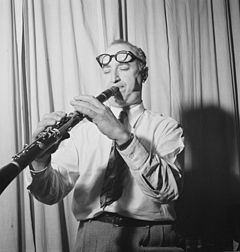- Mezz Mezzrow
-
Mezz Mezzrow Birth name Milton Mesirow Born November 9, 1899 Origin Chicago, Illinois, United States Died August 5, 1972 (aged 72) Genres Dixieland
Mainstream jazzInstruments Alto saxophone
tenor saxophone
clarinetMilton Mesirow, better known as Mezz Mezzrow (November 9, 1899 – August 5, 1972) was an American jazz clarinetist and saxophonist from Chicago, Illinois.[1] Mezzrow is well known for organizing and financing historic recording sessions with Tommy Ladnier and Sidney Bechet. Mezzrow also recorded a number of times with Bechet and briefly acted as manager for Louis Armstrong. However, he is remembered as much for being a colorful character in his autobiography Really The Blues as for his music. It takes its title from a musical piece by Sidney Bechet. The book was co-written by Bernard Wolfe and first published in 1946.
Music career
Mezzrow organized and took part in recording sessions involving black musicians in the 1930s and 1940s including Benny Carter, Teddy Wilson, Frankie Newton, Tommy Ladnier and Sidney Bechet. Mezzrow's 1938 sessions for the French jazz critic Hugues Panassie involved Bechet and Ladnier and helped spark the 'New Orleans revival'.
In the mid-1940s Mezzrow started his own record label, King Jazz Records, featuring himself in groups that usually included Sidney Bechet and, often, trumpeter Oran 'Hot Lips' Page. Mezzrow also can be found and heard playing on six recordings by Fats Waller. He appeared at the 1948 Nice Jazz Festival.
Following that, he made his home in France and organized many bands that included French musicians like Claude Luter, as well as visiting Americans such as Buck Clayton, Peanuts Holland, Jimmy Archey, Kansas Fields and Lionel Hampton. In 1953, in Paris with ex-Basie trumpeter Buck Clayton, he made a recording of the Louis Armstrong's "West End Blues."
Personal life
Mezzrow became better-known for his drug-dealing than his music. In his time, he was so well known in the jazz community for selling marijuana that "Mezz" became slang for marijuana, a reference used in the Stuff Smith song, "If You're a Viper". He was also known as the "Muggles King," the word "muggles" (also the title of a 1928 Louis Armstrong recording), being slang for marijuana at that time.
Mezzrow praised and admired the African-American style. In his autobiography Really The Blues, Mezzrow writes that from the moment he heard jazz he "was going to be a Negro musician, hipping [teaching] the world about the blues the way only Negroes can."
Mezzrow married a black woman, Mae (also known as Johnnie Mae), moved to Harlem, New York, and declared himself a "voluntary Negro." In 1940 he was caught by the police to be in possession of sixty joints trying to enter a jazz club at the 1939 New York World's Fair, with intent to distribute. When he was sent to jail, he insisted to the guards that he was black and was transferred to the segregated prison's black section. He wrote (in Really the Blues):
"Just as we were having our pictures taken for the rogues' gallery, along came Mr. Slattery the deputy and I nailed him and began to talk fast. 'Mr. Slattery,' I said, 'I'm colored, even if I don't look it, and I don't think I'd get along in the white blocks, and besides, there might be some friends of mine in Block Six and they'd keep me out of trouble'. Mr. Slattery jumped back, astounded, and studied my features real hard. He seemed a little relieved when he saw my nappy head. 'I guess we can arrange that,' he said. 'Well, well, so you're Mezzrow. I read about you in the papers long ago and I've been wondering when you'd get here. We need a good leader for our band and I think you're just the man for the job'. He slipped me a card with 'Block Six' written on it. I felt like I'd got a reprieve."
Mezzrow was lifelong friends with French jazz critic Hugues Panassié and spent the last 20 years of his life in Paris. Mezzrow's autobiography, Really the Blues, was co-authored by Bernard Wolfe and published in 1946.
Eddie Condon said of him (We Called It Music, London; Peter Davis 1948): "When he fell through the Mason-Dixie line he just kept going".
References
Clarinet Clarinet family Systems of Fingering Clarinetists Heinrich Baermann · Acker Bilk · Walter Boeykens · Jack Brymer · James Campbell · Eddie Daniels · Buddy DeFranco · Eric Dolphy · Stanley Drucker · Pete Fountain · Martin Fröst · Benny Goodman · Woody Herman · Thea King · Henry Lazarus · Karl Leister · Sabine Meyer · Pee Wee Russell · Artie Shaw · David Shifrin · Anton Stadler · Milenko Stefanović · Richard StoltzmanClarinet makers Category:Clarinet makers · Category:Clarinet manufacturing companies · List of clarinet makers · Amati-Denak · E. K. Blessing · Buffet Crampon · Johann Christoph Denner · Benedikt Eppelsheim · Stephen Fox · Heinrich Grenser · Howarth of London · Jupiter Band Instruments · Leblanc · Iwan Müller · Adolphe Sax · Selmer · Yamaha CorporationOther Category:Clarinets · Category:Compositions for clarinet · Clarinet choir · Clarinet concerto · Clarinet sonata · Clarinet-violin-piano trioCategories:- 1899 births
- 1972 deaths
- Dixieland clarinetists
- Dixieland saxophonists
- American jazz clarinetists
- American jazz saxophonists
- Jewish American musicians
- Blue Note Records artists
Wikimedia Foundation. 2010.

